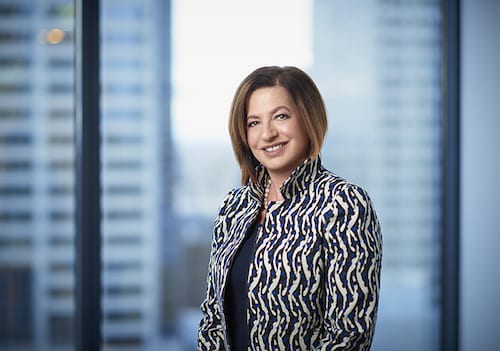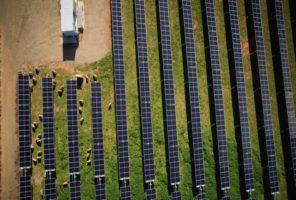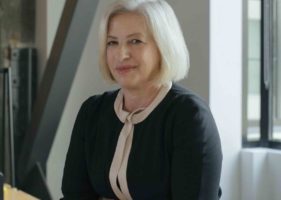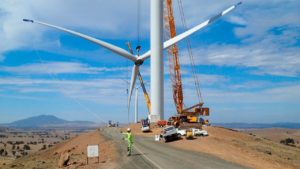The CEO of the Australian Energy Market Operator, Audrey Zibelman, is to leave the organisation and take up a new position as head of Google X, now known simply as X, and described as a “moonshot” initiative to develop new reliable and affordable clean energy.
The announcement was made on Tuesday, and comes a little over three and a half years after Zibelman took up the role as the head of AEMO, which was under severe pressure at the time after the state-wide blackout in South Australia.
Zibelman is widely credited for initiating a cultural change in the organisation, and also for leading the push to create a 20-year blue-print to plan the transition of the Australian grid to renewables, known as the Integrated System Plan.
Zibelman will step down at the end of calendar year and return to the US, where she will take up the new job at X in San Francisco, where she will take a newly created tole and lead an early stage team working to develop new technologies.
“It has been a great privilege to lead AEMO as Australia experiences and embraces a rapid transformation of the generation mix,” she said in a statement.
“Understanding, confronting and solving the myriad new challenges the energy transition requires is a vital task and one AEMO is playing a leading role in addressing.”
The AEMO ISP plots a path to deal with five different scenarios, and apart from a disastrous “slow change” option, where governments intervene to prevent the uptake of new renewable and storage technologies, the result is a renewables mix of between 70 per cent in the central scenario and 94 per cent in the “step change” scenario.
It was not a message that everyone wanted to hear. The federal government has barely acknowledged the document, and some conservative commentators such as the shock-jock turned TV host Alan Jones called for her removal and made personal attacks.
AEMO has also been pushing for change in the design of market rules, and has often been at loggerheads with the market’s principal rule maker, the Australian Energy Market Commission. But AEMO has also been criticised for connection delays, particularly in Victoria where it has direct responsibility.
Zibelman said that Australia – which she has said is and will experience the most rapid energy transition in the world – is being watched carefully by the rest of the world.
“AEMO is an amazing organisation and what Australia is learning and accomplishing through the energy transformation is critical not only for our nation but is being watched by the rest of the world,” she said.
“The decision to leave my colleagues here and the many friends I have made both in and out of the industry in Australia was far from easy. However, what I have learned in Australia is how important advanced computing and the application of artificial intelligence (AI) and machine learning is to our industry.
“The opportunity to support these needs as part of the team at X is for me a compelling opportunity to support the power sector both here and globally as we navigate to greater electrification of our economy and a diverse, decarbonised power system.”
Her departure was met with messages of regret from many in the industry.
AEMO chairman Drew Clarke said the AEMO Board is “very sorry” to see Audrey leave, and a search for her replacement will begin immediately.
“She has been an outstanding leader through a time of significant change and has made a major contribution to the Australian energy transition. We wish Audrey every success in her new global energy role,” Clarke said in a statement.
Billionaire Mike Cannon Brookes described her as “one of the good ones” and Miles George, former boss of Infigen Energy and Cleanco, and former chair of the Clean Energy Council also applauded her work.
“I’m really sad to see her go,” Energy Security Board chair Kerry Schott told RenewEconomy. “I wish her all the best and she has an interesting job (at X). I’m really glad that she is staying around until December.”
Schott said she was not surprised by Zibelman’s departure given her family is in the US, and Covid-19 had “made us all feel we want to be near our family.”
But Schott was confident that there would be quality candidates to succeed her and continue the job. “I don’t reckon they will have a huge trouble attracting people. Australia is in such an interesting position. Fingers crossed, I must say.”
Simon Holmes a Court, from the Climate and Energy College in Melbourne, said Zibelman has overseen a positive and much needed cultural change at AEMO.
“These days the market operator looks far into the inevitable decarbonisation of our electricity sector and anticipates the challenges that must be overcome along that the journey. At the same time, the organisation has never had a better grasp on maintaining reliability in the here-and-now, despite an increasingly complex operating environment.”
X describes itself as a moonshot factory. “Our job is to invent breakthrough technologies designed to make the world a radically better place and create successful businesses along the way,” it says.
Some of X’s best known moonshots include Waymo driverless cars, Verily Life Sciences and Wing delivery drones.Some of X’s current projects include Tidal a moonshot in ocean health and the Computational Agriculture project which is working to find new ways to produce food more sustainably.
It has also focused on energy-efficient delivery drones to reduce carbon emissions and air pollution, kites that produce electricity by harnessing energy from the wind,new drills to bring geothermal power to homes, smart storage solutions for renewable energy and carbon-neutral fuel from seawater.















